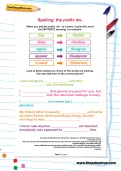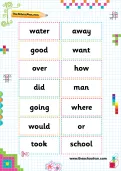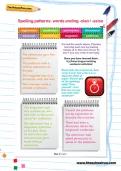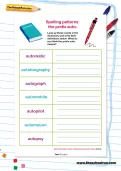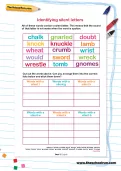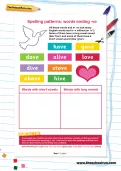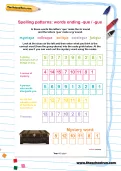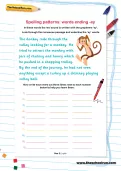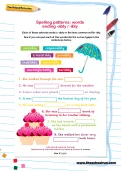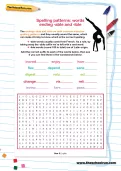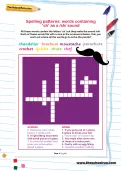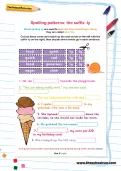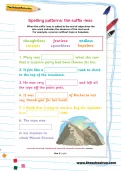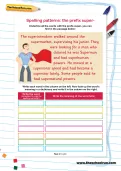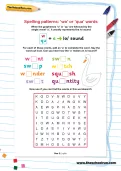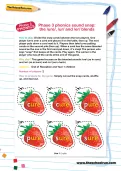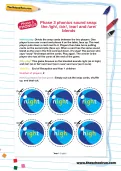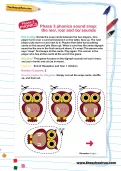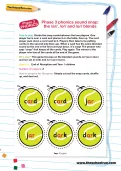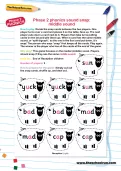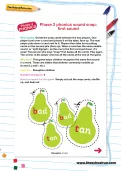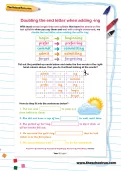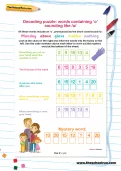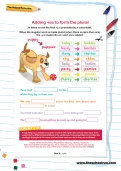All these words end in -ve (not many English words end in -v without an ‘e’!). Some of them have a long vowel sound (like ‘five’) and some of them have a short vowel sound (like ‘give’). Can you sort them into words with short vowels and words with long vowels?
or
Register to add to your saved resources
Already a subscriber? to view this content.
In words like antique and catalogue the letters ‘que’ make the /k/ sound and the letters ‘gue’ make a /g/ sound. Look at the clues on the left and then enter what you think is the correct word (from the group above) into the code grids below. At the end, see if you can work out the mystery word using the codes.
or
Register to add to your saved resources
Already a subscriber? to view this content.
In these words the /ee/ sound is written with the grapheme ‘ey’. Look through this nonsense passage and underline the ‘ey’ words. Then write each word out three times to help you learn them
or
Register to add to your saved resources
Already a subscriber? to view this content.
Each of these adverbs ends in -ably or the less common suffix -ibly. See if you can put each of the words into the correct gaps in these sentences.
or
Register to add to your saved resources
Already a subscriber? to view this content.
The endings -able and -ible are both common adjective spelling patterns and they usually sound the same, which can make it tricky to know which is the correct spelling. Add the correct suffix to each of these words then see if you can find them in the wordsearch.
or
Register to add to your saved resources
Already a subscriber? to view this content.
All these words contain the letters ‘ch’ but they make the sound /sh/. Each of these words fits with a clue in the crossword below. Can you work out where all the words go to solve the puzzle?
or
Register to add to your saved resources
Already a subscriber? to view this content.
Words ending -ly are used to describe how something is done; they are called adverbs. Cut out these cards and match up the root words on the left with the suffix -ly on the right, then decide which words go in each sentence.
or
Register to add to your saved resources
Already a subscriber? to view this content.
When the suffix -less is added to the end of adjectives the new word indicates the absence of the root word. For example, a person without hope is hopeless. Fill the correct word in these sentences.
or
Register to add to your saved resources
Already a subscriber? to view this content.
Underline all the words with the prefix super- you can find in the passage. Then write each word in the column on the left. Now look up the word’s meaning in a dictionary and write it in the column on the right.
or
Register to add to your saved resources
Already a subscriber? to view this content.
When the graphemes ‘w’ or ‘qu’ are followed by the single vowel ‘a’, it usually represents the /o/ sound as in swan. For each of these words, add an ‘a’ to complete the word. Say the
word out loud. Can you hear how the ‘a’ makes an /o/ sound? Then have a go at the wordsearch.
or
Register to add to your saved resources
Already a subscriber? to view this content.
The letter ‘w’ followed by the ‘or’ grapheme makes the /er/ sound as in worm. Can you work out where these words should go in these sentences?
or
Register to add to your saved resources
Already a subscriber? to view this content.
Let's play a game of snap! Listen out for the /ure/, /ur/ and /er/ blends.
or
Register to add to your saved resources
Already a subscriber? to view this content.
Let's play a game of sound snap. Listen out for the /igh/, /air/, /ear/ and /ure/ blends!
or
Register to add to your saved resources
Already a subscriber? to view this content.
Let's play a game of sound snap with the /ee/, /oo/ and /oo/ sounds. Just cut out the card, shuffle and deal!
or
Register to add to your saved resources
Already a subscriber? to view this content.
Let's play a game of sound snap! Listen out for the /ar/, /or/ and /ur/ blends.
or
Register to add to your saved resources
Already a subscriber? to view this content.
Let's have a game of snap! Can you hear the middle sound in these words?
or
Register to add to your saved resources
Already a subscriber? to view this content.
Let's have a game of sound snap. Just cut out the snap cards, shuffle up, and deal out!
or
Register to add to your saved resources
Already a subscriber? to view this content.
Most words longer than one syllable that have the stress on the last syllable when you say them and end with a single consonant, we double the last letter when adding the suffix -ing. Can you cut out the jumbled-up cards and make the five -ing words? Then see if you can fit them into the sentences.
or
Register to add to your saved resources
Already a subscriber? to view this content.
This list of words include an ‘o’, pronounced as the short vowel sound /u/. Look at the clues on the right and enter the words into the boxes on the left. Use the code numbers above each letter to work out the mystery word at the bottom of the sheet.
or
Register to add to your saved resources
Already a subscriber? to view this content.
In these nouns the final -y is preceded by a consonant. When the singular word is made plural (when there is more than one) the -y is made into an i and -es is added. Can you complete these sentences?
or
Register to add to your saved resources
Already a subscriber? to view this content.
